Today’s Current Affairs: 10th June 2024 for UPSC IAS exams, State PSC exams, SSC CGL, State SSC, RRB, Railways, Banking Exam & IBPS, etc
Table of Contents
Child Nutrition Report, 2024
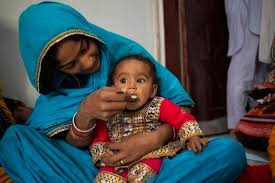
UNICEF has released its Child Nutrition Report 2024, highlighting the severe level of Child Food Poverty globally.
- The inability of children, especially in early childhood (first five years), to access and consume a nutritious and diverse diet.
Key Findings of the Report:
- 27% of children globally; 40% in India (2nd highest in South Asia).
- CFP results from failing governance systems, not failing families.
- Rise in unhealthy food consumption replacing nutrient-rich options.
- Affects both poor and non-poor households, showing income isn’t the sole factor.
- Global efforts are slow in ending CFP
- Children in severe CFP lack nutrient-rich foods; unhealthy foods dominate.
- Global food/nutrition crises, conflicts, and climate shocks worsen CFP.
- Higher CFP correlates with higher stunting rates.
- Poor food environments, poor feeding practices, climate crisis and household income poverty.
Status of CFP in India:
- Prevalence of Malnutrition (NFHS-5): Children Under 5: 35.5% stunted, 19.3% wasted, 32.1% underweight, 3% overweight
- Prevalence of Anaemia: Pregnant Women (15-49 years): 52.2%; Children (6-59 months): 67.1%
- State of Food Security and Nutrition in the World Report (2023): Diet Affordability: 74% of the population cannot afford a healthy diet; 39% lack a nutrient-adequate diet.
- Global Hunger Index (2023): GHI Score: 28.7 (serious); Child Wasting Rate: 18.7% (highest in the report)
Duty Drawbacks:

Starting from June 5th, 2024, the Central Board of Indirect Taxes and Customs (CBIC) has initiated electronic disbursal of duty drawback amounts directly to exporters’ bank accounts through the Public Finance Management System (PFMS).
- Duty drawback, governed by section 75 of the Customs Act, 1962, refunds customs duty on imported or excisable materials used in the production of export goods.
- This mechanism assists exporters in mitigating some of the expenses incurred during the export process, particularly within the supply or value chain.
- Electronic disbursal of duty drawback aims to streamline the process, reduce processing time, eliminate manual intervention, and enhance transparency in customs operations.
- This initiative aligns with CBIC’s commitment to paperless customs and trade facilitation, building upon its implementation of the WTO Trade Facilitation Agreement (TFA).
Nagi And Nakti Bird Sanctuaries: Added To Ramsar List
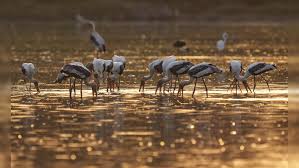
Nagi and Nakti bird sanctuaries in Bihar’s Jamui district are now recognized under the Ramsar Convention, bringing India’s total Ramsar sites to 82.
- Nagi-Nakti Wetland in Bihar’s Jamui district, nestled within the Jhajha forest range, are man-made reservoirs surrounded by dry deciduous forests and hills.
- Developed primarily for irrigation, they host diverse flora and fauna, including over 150 bird species, mammals, fish, aquatic plants, reptiles, and amphibians.
- They are also designated as Important Bird and Biodiversity Areas by BirdLife International. They provide habitat for various migratory and resident bird species.
Ramsar Convention:
- It was adopted in 1971 and aims to conserve and wisely use wetlands and their resources, with India becoming a party in 1982.
- India and China rank third globally for Ramsar Sites, each with 82 sites.
- The United Kingdom leads with 175, followed by Mexico with 144.
- India’s Ramsar Sites have increased from 26 to 82 in the last decade, with 40 added in the past three years.
India Exim Bank Opens Nairobi Office To Boost East Africa Trade:
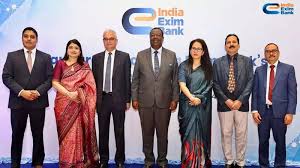
The Export-Import Bank of India (India Exim Bank) recently opened its East Africa Representative Office in Nairobi, Kenya.
- This is part of a plan to grow its business around the world.
- The goal of this project is to improve India’s trade and business ties with East Africa, which is known for having a lot of resources and young people.
- India and East Africa have done a lot more business with each other over the past ten years.
- From USD 9.7 billion in 2013 to USD 12.9 billion in 2022, trade in goods grew quickly.
- India’s exports to East Africa went from USD 8.6 billion in 2013 to USD 9.4 billion in 2022, which shows that trade ties are still getting better.
- The India Exim Bank is the country’s main bank. Its job is to finance, facilitate, and promote India’s foreign trade and investments.
- As part of India’s economic diplomacy, one important part of its job is to help make policy and provide money for projects that will be exported.
- The Bank has offices in Abidjan, Côte d’Ivoire, and Johannesburg, South Africa.
- These strategic locations in important African cities show that the Bank is committed to building economic ties with the region.
Sebi Wins ‘Best Business Regulator’ Award In Asia Pacific:

According to The Asian Banker, the Securities and Exchange Board of India (SEBI) was recently given the “Best Conduct of Business Regulator” award for the Asia-Pacific area.
- This award, which was given in an event in Hong Kong, shows how important SEBI has been in improving the rules that govern Indian stock markets.
- Kamlesh Chandra Varshney, a Permanent Member of SEBI, accepted the award on behalf of the organization.
- SEBI has taken several important steps that have made the Indian stock market much more efficient and trustworthy.
- The introduction of the T+1 settlement method is one of the important projects.
- This method, which began to be put in place gradually in 2021 and was fully operational by January 2023, has greatly cut the time it takes for investors to get to their money after trading, which has increased market liquidity and efficiency.
- The Asian Banker pointed out that SEBI has not only made the market more efficient through strict enforcement and new regulatory practices, but it has also made sure that customers are treated fairly and kept the market’s integrity strong.
Non-Permanent Members Of The UNSC:
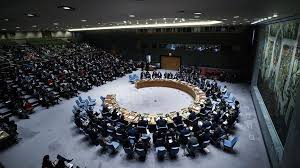
Pakistan, Panama, Somalia, Denmark, and Greece have been elected as non-permanent members of the UN Security Council for a two-year term starting in 2025. This marks Pakistan’s 8th term as a non-permanent member
- India has been elected as a non-permanent member of the UN Security Council 8 times, the last being 2021-2022.
- The UNSC is one of the six principal organs of the UN, along with the UNGA, Economic and Social Council, Trusteeship Council, International Court of Justice, and UN Secretariat.
- It consists of 15 members, with five permanent members (China, France, Russia, the UK, and the US) holding veto power.
- The UNSC has primary responsibility for maintaining international peace and security.
- United Nations General Assembly (UNGA) annually elects five non-permanent members of the United Nations Security Council (UNSC) for a two-year term through a secret ballot.
AUKUS Alliance And Its Pivot To France:
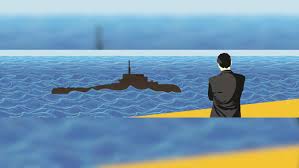
The article discusses the AUKUS alliance among the US, UK, and Australia to bolster military capabilities against China, including sharing nuclear submarine technology.
- AUKUS, a trilateral partnership formed in 2021, aims to bolster security and defence interests, primarily countering China’s influence in the Indo-Pacific region.
- It entails deeper information and technology sharing, along with the integration of security-related industries.
- India is not a member but has engaged in informal talks with the AUKUS bloc on emerging technologies, though no formal dialogue has taken place yet.
- AUKUS shares nuclear submarine propulsion technology with Australia, marking the first time the U.S. has done so outside the UK.
- Additionally, the partnership spans eight high-tech military domains, including AI, quantum technologies, cyber warfare, undersea warfare, hypersonic technologies, electronic warfare, and innovation/information sharing.
- For instance, an algorithm enhancing sonobuoy data sharing from P-8 Poseidon aircraft is among the initial technologies utilized.
- Despite operating similar aircraft to AUKUS nations, India wasn’t offered participation in AUKUS’s nuclear technology sharing.
- Traditionally, the US reserves such technology for closer allies.
Biopharmaceutical Alliance:

India, South Korea, the United States, Japan, and the European Union (EU) have formed a Biopharmaceutical Alliance to address drug supply shortages during the COVID-19 pandemic.
- The alliance aims to coordinate bio policies, regulations, and research and development support measures among participating countries.
- Inaugural meeting held in San Diego during the Bio International Convention 2024, emphasized the importance of a reliable and sustainable supply chain.
- The initiative originated from discussions between South Korea and the U.S. and expanded to include Japan, India, and the EU.
- Shortages of Covid-19 vaccines occurred globally, impacting various countries’ vaccination efforts.
- Drugs such as Remdesivir, used for treating severe Covid-19 cases, experienced shortages in many countries.
- As COVID-19 cases surged, many countries faced shortages of medical oxygen, crucial for treating severe respiratory symptoms.
- Shortages of PPE, including masks, gloves, and gowns, occurred worldwide, posing risks to frontline healthcare workers.
India’s Foreign Exchange Reserves Hit Record $651.5 Billion:

With $651.5 billion in foreign exchange reserves by May 31, 2024, India had the highest amount of foreign exchange reserves ever. Positive changes in trade, remittances, and foreign investments have helped India’s external industry reach a strong point.
- The Reserve Bank of India (RBI) says that service exports, especially software, business services, and travel, have grown a lot.
- After growing by 4.2% in the fourth quarter of 2023–24, net service exports went up by 9.3% over the same quarter.
- The RBI Governor talked about how important GCCs are and how they have helped software and business services exports a lot. GCC countries have increased the amount of foreign currency coming into India.
- It is expected to rise from 1,580 in 2022–23 to about 1,900 by 2024–25.
- India will receive 15.2% of all remittances in 2024, making it the biggest receiver of remittances in the world. Remittances came in more than $100 billion in the first nine months of FY 2023–24.
- The trade deficit is lower because of strong growth in services and strong remittance transfers.
- This makes the current account deficit less severe. It is expected that the current account deficit will stay within manageable levels for the whole fiscal year 2024–25.
- India received a net of $41.6 billion in FPI in 2023–24. But things have changed in the first few months of 2024–25. On 05 June, 2024, net losses were $5 billion.
- Gross FDI entries stayed strong through 2023–24, even though net FDI slowed down.
- India also stayed on top as the best place in the Asia-Pacific region for new foreign direct investment (FDI).
- Both ECBs and non-resident savings came in more than they did the year before. Between 2023 and 2024, the number of ECB deals grew by a large amount.
STPI Celebrated 33rd Foundation Day In New Delhi:

STPI Celebrated 33rd Foundation Day in New Delhi.
- Software Technology Parks of India (STPI), an autonomous society under the Ministry of Electronics and Information Technology (MeitY), celebrated its 33rd Foundation Day on 5th June 2024 at a special event held in New Delhi, Delhi.
- The foundation day event was held under the theme “Positioning Bharat as a Tech Product Nation”.
- STPI launched two new web portals, SayujNet, a networking and resource discovery platform, and STPI-Workspace, an STPI Workspace portal.
- STPI also announced its new initiative under the brand name “Ananta
- Krishnan, Secretary (MeitY) released the DeepTech Knowledge Report on “Cutting-Edge Tech Forging India a Software Product Nation”
Software Technology Parks of India (STPI):
- STPI, established on 5th June 1991, is registered as an autonomous society under the Societies Registration Act, 1860.
- Director General (DG)- Arvind Kumar
- Headquarters- New Delhi, Delhi
Somalia Wins Non-Permanent Seat On UN Security Council:
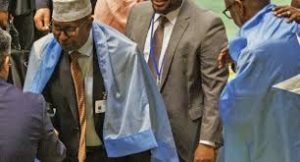
Somalia has reached a major milestone by becoming the first country since the 1970s to have a non-permanent place on the UN Security Council.
- This change, which was revealed after a vote in the 193-member UN General Assembly in which Somalia got 179 votes, is a major step forward in the country’s international relations and government after decades of civil war.
- The seat is meant for East Africa, and Somalia won it without any competition.
- After President Mohamed Siad Barre was removed from office in 1991, Somalia fell into civil war. Rival clans and leaders fought each other for years.
- The UN and the African Union (AU) have played a big role in trying to settle the country and get central government back in place during these troubled decades.
- Recently, the central government has also been fighting the Islamist terrorist group al-Shabab. As foreign troops leave, these efforts are getting stronger.
- The Security Council has 15 members: the US, the UK, France, China, and Russia are the five permanent members; the other ten members are non-permanent members.
- These aren’t permanent seats; they’re split up by global area, and each person serves for two years without the power to veto.
- Non-permanent members have a lot of power because they can change the way debates and votes are conducted on important topics like peacekeeping missions and sanctions.




